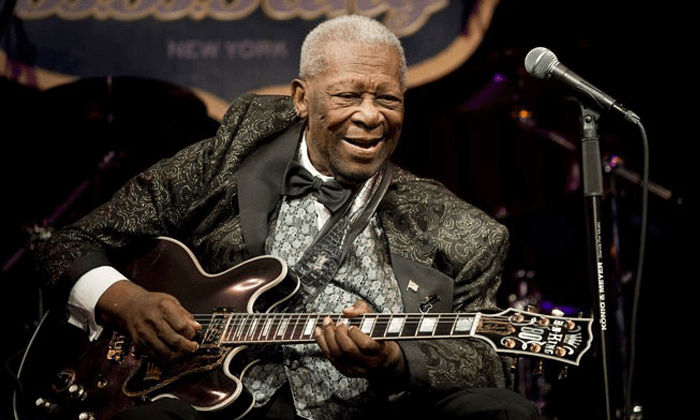Birebir ve Uzaktan Gitar Kursu
|
Notes & Tab
He was born September 16, 1925, on a plantation in Itta Bena, Mississippi, near Indianola. In his youth, he played on street corners for dimes, and would sometimes play in as many as four towns a night. In 1947, he hitchhiked to Memphis, TN, to pursue his music career. Memphis was where every important musician of the South gravitated, and which supported a large musical community where every style of African American music could be found. B.B. stayed with his cousin Bukka White, one of the most celebrated blues performers of his time, who schooled B.B. further in the art of the blues. For more than half a century, Riley B. King – better known as B.B. King – has defined the blues for a worldwide audience. Since he started recording in the 1940s, he has released over fifty albums, many of them classics. B.B.’s first big break came in 1948 when he performed on Sonny Boy Williamson’s radio program on KWEM out of West Memphis. This led to steady engagements at the Sixteenth Avenue Grill in West Memphis, and later to a ten-minute spot on black-staffed and managed Memphis radio station WDIA. “King’s Spot,” became so popular, it was expanded and became the “Sepia Swing Club.” Soon B.B. needed a catchy radio name. What started out as Beale Street Blues Boy was shortened to Blues Boy King, and eventually B.B. King. Soon after his number one hit, “Three O’Clock Blues,” B.B. began touring nationally. In 1956, B.B. and his band played an astonishing 342 one-night stands. From the chitlin circuit with its small-town cafes, juke joints, and country dance halls to rock palaces, symphony concert halls, universities, resort hotels and amphitheaters, nationally and internationally, B.B. has become the most renowned blues musician of the past 40 years. Over the years, B.B. has developed one of the world’s most identifiable guitar styles. He borrowed from Blind Lemon Jefferson, T-Bone Walker and others, integrating his precise and complex vocal-like string bends and his left hand vibrato, both of which have become indispensable components of rock guitarist’s vocabulary. His economy, his every-note-counts phrasing, has been a model for thousands of players, from Eric Clapton and George Harrison to Jeff Beck. B.B. has mixed traditional blues, jazz, swing, mainstream pop and jump into a unique sound. In B.B.’s words, “When I sing, I play in my mind; the minute I stop singing orally, I start to sing by playing Lucille.” In 1968, B.B. played at the Newport Folk Festival and at Bill Graham’s Fillmore West on bills with the hottest contemporary rock artists of the day who idolized B.B. and helped to introduce him to a young white audience. In 1969, B.B. was chosen by the Rolling Stones to open 18 American concerts for them; Ike and Tina Turner also played on 18 shows. B.B. was inducted into the Blues Foundation Hall of Fame in 1984 and into the Rock and Roll Hall of Fame in 1987. He received NARAS’ Lifetime Achievement Grammy Award in 1987, and has received honorary doctorates from Tougaloo(MS) College in 1973; Yale University in 1977; Berklee College of Music in 1982; Rhodes College of Memphis in 1990; Mississippi Valley State University in 2002 and Brown University in 2007. In 1992, he received the National Award of Distinction from the University of Mississippi. In 1991, B.B. King’s Blues Club opened on Beale Street in Memphis, and in 1994, a second club was launched at Universal CityWalk in Los Angeles. A third club in New York City’s Times Square opened in June 2000 and most recently two clubs opened at Foxwoods Casino in Connecticut in January 2002. In 1996, the CD-Rom On The Road With B.B. King: An Interactive Autobiography was released to rave reviews. Also in 1996, B.B.’s autobiography, “Blues All Around Me” (written with David Ritz for Avon Books) was published. In a similar vein, Doubleday published “The Arrival of B.B. King” by Charles Sawyer, in 1980. B.B. passed away in his sleep on May 14th 2015.
0 Comments
Leave a Reply. |
|||||||||||||||||||||||||||||||||||||||||||||||||||||||||||||||||||||||||||||||||||||||||||




